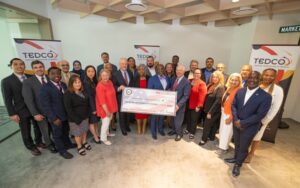
(SOURCE: FITCI)
Fort Detrick Alliance and FITCI Annual Showcase Highlights Government-Business Connections
The annual Fort Detrick Alliance-FITCI Showcase was officially reinstated this past October after a two-year break during the pandemic, with its thirteenth installment at FITCI’s Metropolitan Court location. City and county officials helped FITCI (Frederick Innovative Technology Center, Inc.) and the Fort Detrick Alliance showcase the presenting companies’ work and the government-business partnerships that can help them grow.
Before the tech showcase began in the building’s hallways, FITCI president Kathie Callahan Brady and Fort Detrick Alliance executive director Christy Butler welcomed the many attendees outside with a presentation, helped by county and city officials. The presenters commented on the importance of the biotech and life sciences industry in Frederick and how government officials are committed to helping those companies grow.
Frederick County Executive Jan Gardner commented that of the 80+ biotech companies in Frederick County, more than two dozen had started at FITCI. She said that the industry has also helped bring more than two billion dollars into Maryland’s economy.
“We’re really proud of the work being done in our community to improve the life and the health of patients and people. Because that’s what really matters to all of us, is making life better for people. We can be proud of the collaboration between all of our economic development partners, FITCI, and our national research facilities,” Gardner said. “Today’s showcase is an example of that partnership in action.”
Mayor Michael O’Connor echoed Gardner’s remarks, speaking about Frederick’s commitment to the Fort Detrick Alliance and FITCI. He said that the influence of both organizations helps make Frederick one of the best places to live.
“All the work that Kathie Callahan Brady and her board president Ted Gregory do on behalf of FITCI really creates a wonderful opportunity to incubate and accelerate these tech companies that are taking these products, licensing, federal technology, and doing things that make the lives of our residents and people around the world better,” O’Connor said. “And that’s happening right here in Frederick County, and I think that’s something to be proud of.”
Col. Christopher Todd, chief of staff at the United States Army Medical Research and Development Command (USAMRDC), gave the keynote speech at the event, speaking on the importance of the division’s work and how they can partner with small businesses to move that work forward.
“The Department of Defense at large is in the midst of an evolution on how we organize, train, equip, and posture in order to deter potential adversaries,” Todd said. “MRDC plays a critical role in this process. And our expertise has been sought to support the requirements of the army of the future.”
In order to fulfill those goals, Todd said MRDC routinely partners with small businesses, especially through CRADAs, or contracts between private companies and federal labs. CRADA (Cooperative Research and Development Agreement) partners can be other federal partners, learning institutions, or start-ups.
“So CRADA relationships save both time and resources to achieve mutually beneficial results. They help accelerate the commercialization of new technologies. They enhance the credibility of companies through their work with the federal laboratory,” Todd said. “CRADAs increase a company’s technical capabilities and standards while raising the federal lab’s awareness of the commercial sector’s solutions and purchase opportunities.
Todd highlighted past successful partnerships, such as one with Surgicure, which produces bite blocks specifically for burn patients. Another technology that the tech transfer team was working on is the System for Thermogenic Emergency Airway Management, or STEAM, which helps wounded or sick soldiers stay warm while waiting to be transferred to their next care site.
“These technologies will help the nation stay ahead by minimizing threats and maximizing human potential,” Todd said. “So as we continue to develop those capabilities for the warfighter, we will continue our collaboration with local businesses to develop, acquire, integrate, and sustain medical technologies for both the military and civilian markets.”
Butler, who has served in the military before her time at the Fort Detrick Alliance, said she was proud to find out that so many of the life-saving technologies she saw on the battlefield in Afghanistan were invented in her hometown of Frederick.
“I’ve seen the benefits of the research and development that goes on,” Butler said. “… So we are very thankful for everything that goes on at Ft Detrick.”
During the rest of the program, Brady congratulated the four companies that have graduated from FITCI during the pandemic: Theradaptive, Key City Compost, Wellspring Digital, and ServeFed. The companies, which missed out on their typical graduation and ribbon-cutting ceremonies during the pandemic, were gifted plaques full of FITCI’s mentor CEOs’ favorite quotes.
While most of the companies came into FITCI as small start-ups without employees, they are now booming businesses that quickly outgrew their shared spaces at the incubator. Theradaptive, one of the graduating companies, now has over 20 employees across multiple offices. The company specializes in regenerative medicine to help save limbs and is headed toward clinical trials.
While Brady loves to see FITCI’s companies grow, she also wants them to stay close to the incubator and offer their expertise to new start-up companies.
“I hate to say it, but you don’t want a bunch of startups to hang out with a bunch of start-ups,” Brady said. “You want startups to hang out with much more seasoned and sharp individuals.”
For example, BioFactura, which graduated from FITCI in 2016, currently still rents space in the Metropolitan Court building in addition to other spaces around town. Now, leaders of the company help mentor new start-ups at FITCI.
“It’s great just to hopefully help them not make the same mistakes we made,” said President and CEO Darryl Sampey. “So that’s my favorite thing to do is just to help them avoid the avoidable. Because there’s a lot of avoidable [things], but there’s a lot of challenges and hurdles to overcome, so it’s tough.”
BioFactura also got its start thanks to Fort Detrick. Sampey licensed one of his products through Fort Detrick and ended up getting a $68 million contract with the government as a result.
Partnering with the community is at the core of what FITCI and the Fort Detrick Alliance do. Both organizations have helped countless companies get their start developing new technologies to help people worldwide.
“See, it’s really easy for me to boast about our success rates because it’s not ours, it’s yours,” said Brady. “It has to do with the Frederick community, it’s our 500-plus member ecosystem that wraps your services, your advice, your connections and wisdom around our entrepreneurs. That doesn’t happen anywhere else at any other incubator. And it’s because it’s here in Frederick. So thank you all for that.”







